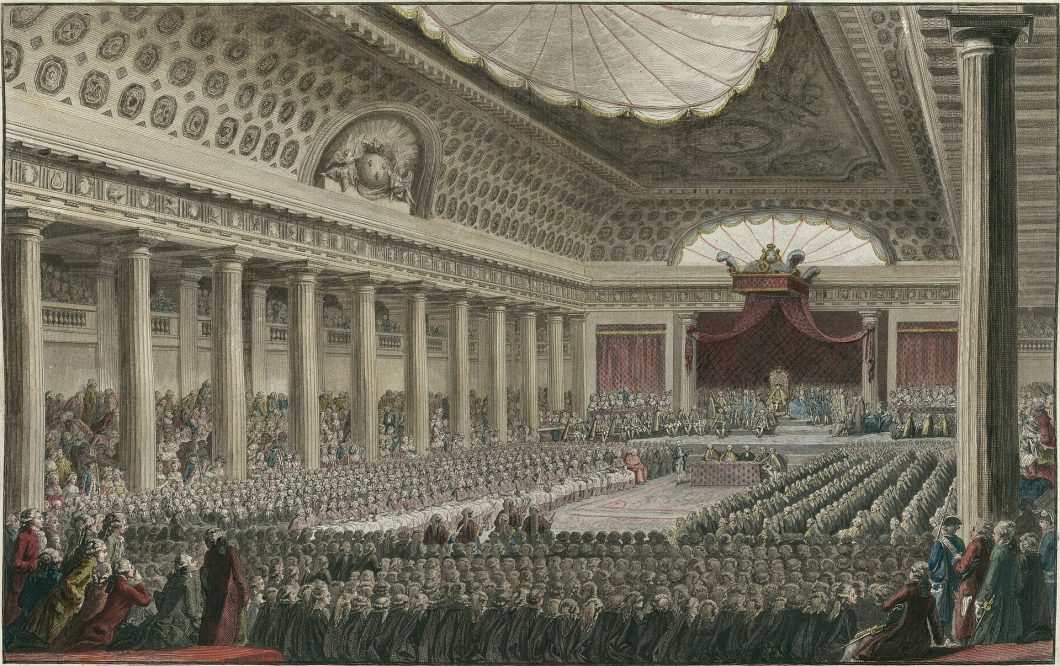There is no precedent for a measure like DACA, concretely debated and rejected by Congress, to have been, nonetheless, put into effect by the president.
Separation of Powers in the Age of Revolution
Liberty Fund has produced a beautiful edition of an important work of 18th-century French political theory. On Executive Power in Great States is a revised translation of the 1792 English edition of Jacques Necker’s work, with an illuminating introduction by Aurelian Craiutu, a leading expert on the topic.
Jacques Necker was a wealthy Swiss Protestant financier who played a critical role as both a statesman and an author in the history of France before and during the French Revolution. Beginning in 1776, He served as director of the Royal Treasury for King Louis XVI and attempted to introduce both political and financial reforms in that beleaguered kingdom. In 1789, he presided as the King’s Minister over the convocation of the Estates-General.
Disappointed in his hopes of reform, he returned to his native Switzerland later that year. In the years of his retirement, he wrote On Executive Power in Great States, along with works on the history of the French Revolution, religion, and politics. The present book was an extended argument for the institution of a dynastic constitutional monarchy in France, a defense of limited government characterized by separation of powers between a powerful, veto-wielding executive and a bicameral legislature, and a searching critique of the conception of popular sovereignty that underpinned the legislative acts of the Constituent Assembly of 1789-91.
Like other influential French thinkers of the 18th century (as well as American statesmen like Alexander Hamilton), Necker was deeply impressed by the English Constitution, which appeared to them to combine stability, political and religious liberty, national glory, and economic dynamism in a uniquely successful fashion. Despite the ostensibly monarchic structure of England’s constitution, these authors perceived that it was functionally a republic. Since the Revolution of 1689, the King of England had owed his title to Parliament, and even in the Elizabethan period there had been thinkers who had argued that Parliament could decide the question of royal succession. Moreover, Parliament had successfully asserted the power (as in the Statute of Monopolies of 1623) to cabin the royal prerogative; from the 1300s (if not earlier), Parliament had come to acquire the sole authority to levy taxes; and Parliament exercised political control over governmental administration. England’s effectively “republican” character gave it a régime inimical to tyranny, protective of popular liberty, and conducive to the growth of trade and commerce. Necker described the English model as “the most distinguished political constitution of Europe.”
Necker’s Anglophile predecessors in France included Voltaire, who authored the Philosophical Letters on the English (1733, 1778); Jean-Louis De Lolme, who wrote The Constitution of England (1771, 1775); and perhaps most importantly the Baron de Montesquieu, whose 1748 essay Of the Constitution of England expressed an influential and admiring view of “the beautiful system” of the English. Necker’s themes also echo those of British writers of the period: his emphasis on the importance of tradition over theory, practicality over abstraction, and organic growth over “rational” planning sounds notes similar to Edmund Burke, while his appreciation for the powers of habituation and imagination in political life recall the insights of David Hume.
Although Necker’s work is styled a study specifically of the “executive,” it is more accurately described as a work on separation of powers. Necker’s master premise is that “there is no secure freedom, if there is an authority without balance in the state.” His argument takes its start from the principle that modern “representative” governments derive their authority from the sovereign will of “the people.” That idea underlay the claims of the Constituent Assembly to enact both constitutional and legislative proposals with scarcely any executive interference. But, Necker maintains, if an elected legislature assumes that it alone is authorized to decide in the name of “the people,” then the oppression of minorities waits in the wings. There would be nothing to stop such a legislature from enacting, say, “a distributive mode of taxation which would subject the rich to exceptional sacrifices [that] would exhibit a striking resemblance to the Agrarian laws which were so frequently the topic of tumult and debate in the Roman republic.” Indeed, the way would lie open to the kind of tyranny and terror that France was to see under the Jacobins.
In a deconstructive move, Necker argues that it is “only by a fiction” that anyone can claim to be acting in the name of the sovereign people.
In order to avoid having representation turn into oppression, the separation between “the people” and their “representatives” must be coupled with a further separation—between two governmental powers, both of which can claim to be equally representative of “the sovereign people.” These are the executive and the legislative (the judicial power resides largely in the jury). This separation between the two powers can work to protect the liberties of all members of society, but most especially those of the minorities who lose popular legislative elections.
To achieve this effect, the executive must be enabled to check or thwart legislative decisions that purport to speak for the sovereign people but that in fact constitute the oppression of a minority by the majority. Separation of powers is designed to protect the citizens from each other by rendering them unable to do significant harm to a weaker party of their fellow citizens. To put the matter starkly: separation of powers is intended to perpetuate and constitutionalize a kind of gridlock that preserves a space for private freedom.
Because the distinction between executive and legislative can only have this harm-neutralizing capability if the executive has sufficient power and dignity, much of Necker’s book is dedicated to identifying the powers that must be vested in the executive, including the powers to veto legislative proposals, to appoint subordinate officials, to discipline the military, and to execute the laws. (He derides the idea that laws enacted by a legislature purporting to represent the sovereign people will necessarily command sufficient respect from those they govern to be self-executing, and he pinpoints the weaknesses in decentralized, provincial administration of national laws.) Necker also argues that the French Crown possesses the sanction of hereditary legitimacy which, when joined to substantial enforcement powers, will make execution of the laws effective.
Furthermore, the legislative power must itself be internally divided by yet another separation of powers—between an upper and a lower house, as in England. The lower house will be the more powerful “as to number, credit, and energy,” but it will express only that aspect of the popular will that is “changeable because of its generality, and because of the impassioned elements of which that generality is composed.” The upper house therefore can also claim to express the will of the sovereign people because, being “unchangeable in its condition and functions, [it] represents more particularly the constant interest of the kingdom.”
In one of his most insightful passages, Necker trenchantly criticizes the revolutionary conception of “popular sovereignty.” First, he insists that no “social power” can “lawfully . . . subject[] or expos[e] the present generation to all the calamities of civil war, in deference to the imagined interest of a future race.” Second, in a deconstructive move, he argues that it is “only by a fiction” that anyone can claim to be acting in the name of the sovereign people. Popular sovereignty in a nation as populous as France “is a pure abstraction; for the innumerable wishes and sentiments of a master like this can never be known by the small number of persons appointed to be their interpreters.” The foundational premise for the Constituent Assembly’s claim to unfettered authority was spurious.
Necker presciently saw where France would go: revolutionary turmoil would in time beget a Napoleon. The passions and intrigues of faction would lead to the rise of
an ambitious individual, more fortunate, more skillful, or more daring than the rest who . . . would inspire the multitude with a desire of revolution [and] would also gather around him all those who, tired of the disorders of anarchy, might wish . . . for the return of an unlimited authority and look to it as the only refuge.
The rejection of an effective but limited executive, personified by an hereditary constitutional monarch, would usher in not ordered liberty, but despotism.



